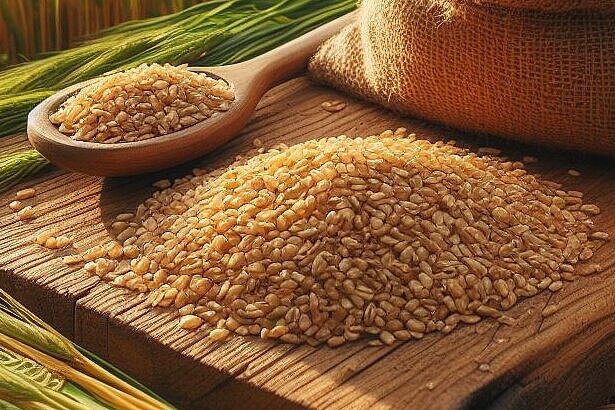Freekeh

Frekeh is a cereal product made from unripe and roasted durum wheat, which is well known in North African and Levantine cuisine. It has a nutty, slightly smoky flavor and a high nutrient density. But is it also good for your dog? In this article, you'll find out everything you need to know about frekeh in relation to dogs.
What is frekeh?
Frekeh (also known as Farīk, Frikeh, Frique, Frik, Fireek, Freeky, Firik or Freek) is a cereal product made from unripe harvested and roasted durum wheat. The wheat is harvested when it is still green and soft and then dried in the sun. It is then roasted over an open fire, which burns off the chaff and gives the grains a smoky flavor. The wheat is then rubbed by hand to remove the remaining chaff. The name frekeh comes from the Arabic word "farīk", which means "to grate".
Frekeh originates from the Middle East and North Africa, where it has been cultivated and eaten for thousands of years. There are various legends about the origins of frekeh, all of which boil down to a fire saving an unripe wheat harvest. Frekeh is prepared as a side dish or main course and is high in fiber, protein, minerals and antioxidants.
What are the benefits of frekeh for dogs?
Frekeh can have several health benefits for dogs when fed in moderation. Here are some of them:
- Frekeh is high in fiber, which can aid digestion and prevent constipation. Fiber can also help regulate blood sugar levels and increase satiety.
- Frekeh is a good source of vegetable protein, which is important for muscle building and cell regeneration. Protein can also strengthen the immune system and accelerate wound healing.
- Frekeh contains many minerals such as iron, zinc, magnesium, calcium and phosphorus, which are essential for bone, blood and nerve health. Iron can prevent anemia, zinc can alleviate skin and coat problems, magnesium can prevent muscle cramps, calcium can prevent osteoporosis and phosphorus can support energy production.
- Frekeh is high in antioxidants such as vitamins A, C and E as well as phenols and carotenoids, which can fight free radicals and prevent cell damage. Antioxidants can also reduce the risk of chronic diseases such as cancer, diabetes and cardiovascular disease.
What are the disadvantages of frekeh for dogs?
While frekeh is healthy for dogs, it is not without risks. Here are some possible disadvantages of frekeh for dogs:
- Frekeh is a grain product and can therefore cause allergies or intolerances. If your dog is sensitive to gluten or other cereal ingredients, you should not give him frekeh or only in very small quantities.
- Frekeh is high in calories and can lead to obesity if fed in large quantities. Obesity can in turn lead to joint problems, diabetes or cardiovascular disease. You should therefore make sure that your dog does not eat too much Frekeh and gets enough exercise.
- Frekeh is not enough to cover your dog's nutritional requirements. You should therefore not use Frekeh as the sole food, but always combine it with other ingredients such as meat, vegetables or fruit. You should also make sure that your dog drinks enough water to absorb the fiber.
How do you feed Frekeh to dogs?
If you want to feed your dog Frekeh, there are a few things you should bear in mind:
- Start with small amounts and observe how your dog reacts to it. If he shows no signs of allergies or intolerances, you can slowly increase the amount.
- Boil Frekeh thoroughly in water or broth until it is soft before feeding. This makes it easier to digest and tastier for your dog.
- Mix Frekeh with other ingredients such as meat, vegetables or fruit to create a balanced meal. You can also add some oil or butter to improve the absorption of fat-soluble vitamins.
- Feed Frekeh no more than two to three times a week and no more than 10% of your dog's daily calorie intake. This corresponds to about half a cup of cooked Frekeh for a medium-sized dog.
Frekeh is a grain product made from unripe and roasted durum wheat that can have many health benefits for dogs. It is rich in fiber, protein, minerals and antioxidants and can promote digestion, immune system and cellular health. However, frekeh can also trigger allergies or intolerances, lead to obesity or reduce the nutrient
If you notice any signs of hypersensitivity or poisoning in your dog, you should see your vet immediately. We are not a substitute for a vet, but we try to be as accurate as possible. Every dog reacts differently and we recommend you get a second opinion or consult your vet if in doubt.
Stay healthy and take good care of your four-legged friend!😊
Similar to Freekeh
Bulgur is a cereal product made from durum wheat semolina. To make bulgur, the semolina is soaked, cooked with steam, dried again and the husks removed. The remaining grains are then coarsely or...
Quinoa is a plant from the foxtail family that grows in the Andes. The seeds of the plant are known as quinoa and are similar in shape and consistency to rice or couscous. Quinoa is gluten-free and...
Farro is a collective term for three different types of wheat: einkorn, emmer and spelt. They all originate from Mesopotamia and have been cultivated for thousands of years. Farro is often referred...
Amaranth is not a real grain, but belongs to the so-called pseudocereals, such as quinoa or buckwheat. This means that it does not contain gluten, which is often responsible for intolerances....



